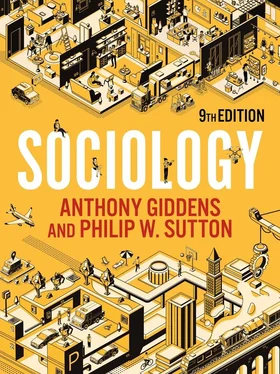
Recent political developments, including those noted here, are further discussed in chapter 20, ‘Politics, Government and Social Movements’, and chapter 21, ‘Nations, War and Terrorism’.
The development of sociological thinking
Many students find sociological theory difficult, not least because they do not understand why the subject has so many different theories. Sociology has never been a discipline where a single body of ideas is accepted as valid by everyone. Sociologists often disagree about how to study human behaviour and how research findings should be interpreted. This is quite normal and is an aspect of all scientific subjects. However, unlike physics or chemistry, sociology involves studying ourselves, and this can severely challenge long-held views and attitudes. Sociology can be unsettling and disturbing. Nonetheless, we must make every effort to set aside our emotional and political commitments, at least while we are in the process of ‘doing sociology’. If we do not, then there is a risk that we will be misled and that our conclusions will not be valid.
Theories and theoretical perspectives
It is a fact that I bought a cup of coffee this morning, that it cost a certain amount of money and that the coffee beans used to make it were grown in Brazil. But in sociology we also want to know why things happen, and that means we have to construct theories which explain the bare facts. We know that many millions of people use the internet and social media to stay in touch with friends. But this is a very recent development which raises some questions. Why did internet use spread so rapidly? How did online social media come about and why do so many people get involved with them? Why are younger people more likely to use social media than older people? What impact are social media sites having on earlier forms of communication? To address questions such as these, we need to collect and assemble the evidence and engage in theorizing.

In this painting by Bruegel, random, often bizarre activities can be seen which collectively make little sense. The title – Netherlandish Proverbs – provides the key to interpreting the painting, which contains over a hundred proverbs that were common in the sixteenth century. For example, at the bottom left someone is ‘banging their head against a brick wall’, on which sits a man who is ‘armed to the teeth’. Evidence collected by sociologists can appear similarly random unless it is set within a general theory which guides our interpretation of the facts.
Theorizing means constructing abstract interpretations of events using a series of logically related statements that explain a wide variety of empirical or ‘factual’ situations. A theory about social media, for example, would be concerned with identifying how information and communications technology (ICT or just IT) has developed over time and what were the prerequisites for their success. In the best sociology, factual research and explanatory theories are closely related. We can only develop valid theoretical explanations if we can test them through empirical research; sociological theories should not be mere speculation. Contrary to popular belief, the facts do not speak for themselves; they need to be interpreted, and interpretation takes place within a set of underlying theoretical assumptions. Many sociologists work primarily on factual research projects, but unless they are guided by some knowledge of theory their work is unlikely to explain satisfactorily the complexity they find. This is true even of research carried out with strictly practical objectives.
Many people see themselves as essentially practical, ‘down to earth’ folks and are suspicious of theorists and theories which appear far removed from their daily life. Yet all practical decisions make some theoretical assumptions. The manager of a business may have no regard for ‘theory’, but she might also believe that her employees are motivated by monetary reward and that the promise of this leads them to work hard. This is a simple underlying theoretical interpretation of human behaviour which the manager takes for granted without realizing or acknowledging it. An alternative view is that most people work in order to make a decent life for their families and monetary reward is merely a means to that less individualistic end. Once we begin to look for satisfactory interpretations of human actions we have to become interested in theories.
Without some kind of theoretical approach, we do not even know what to look for when beginning a study or when interpreting our results at the end of the research process. Theoretical thinking must also tackle general problems of how social life can and should be studied in the first place. Should sociological methods be modelled on the natural sciences? How should we think of human consciousness, social action and social institutions? How can sociologists avoid introducing personal bias into their research? Should they even try? There are no easy answers to such questions, which have been answered in different ways since the emergence of sociology in the nineteenth century.
For thousands of years, attempts to understand human behaviour relied on ways of thinking passed down from generation to generation. Before the rise of modern sciences, ‘folkways’ – traditional knowledge and practices passed down through generations – held sway in most communities, and these persisted well into the twentieth century. One example is people’s understanding of their health or illness. Older people, with a good knowledge of a community’s folkways, provided advice on how to prevent illness and cure diseases. Reflecting on his American childhood in Lawrence County, Kentucky, Cratis Williams gives us a flavour of the Appalachian culture of the time (Williams 2003: 397–8):
A plaque of lead suspended on a string around a child’s neck warded off colds and kept witches away while the child was sleeping. Children plagued by nightmares could wear these lead charms to assure themselves of sweet sleep and pleasant dreams, for nightmares were caused by witches and evil creatures that could not operate in the presence of lead. Adults given to snoring and nightmares sought relief by smelling a dirty sock as they went to sleep.
Today very few people advocate such measures or hold similar beliefs. Instead, a more scientific approach to health and illness means that children are vaccinated against previously common diseases and taught that nightmares are normal and generally harmless. Pharmacies do not routinely sell smelly socks to cure snoring either. The origins of systematic studies of social life lie in a series of sweeping changes ushered in by the French Revolution of 1789 and the mid-eighteenth-century Industrial Revolution in Europe. These events shattered older, traditional ways of life, and the founders of sociology sought to understand how such radical changes had come about. But, in doing so, they also developed more systematic, scientific ways of looking at the social and natural worlds which challenged conventional religious beliefs.
The next section looks at the key ideas of some early thinkers, who, until quite recently, went unchallenged as the key ‘founders’ of sociology. There is no doubt that these early sociologists played an important part in developing a sociological perspective and in establishing sociology as a legitimate academic discipline. However, their focus was on the development of the modern world, what sociologists call modernity , insofar as this refers primarily to Europe and North America. Over the last twenty-five years or so, a movement known as postcolonialism has challenged the accepted account of modernity and the origins of sociology (Bhambra 2014). There are numerous elements in this challenge, which are discussed in chapter 3, ‘Theories and Perspectives’, but two in particular should be borne in mind as you read through the rest of this section.
Читать дальше














